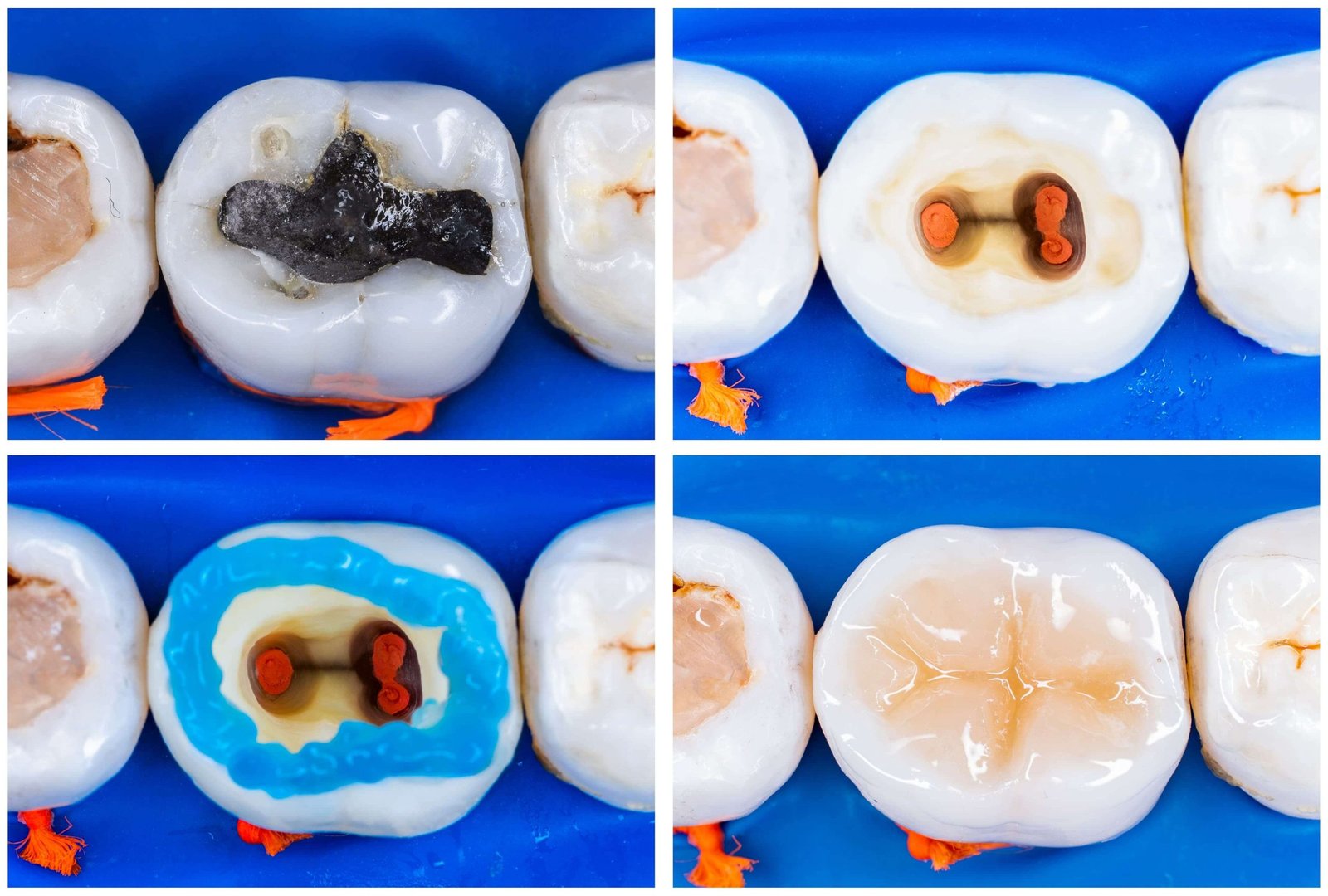A root canal is a dental procedure designed to save a tooth that is badly infected or decayed. It involves removing the damaged pulp from inside the tooth, cleaning and disinfecting it, and then filling and sealing it. Many people wonder how long a root canal will last and what factors influence its longevity. This article will explore these aspects in detail, providing you with a comprehensive understanding of root canal durability.
Key Takeaways on How Long Does a Root Canal Last”
- Longevity of Root Canal Treatments:
- Root canal treatments can last a lifetime with proper care and maintenance. However, the average lifespan ranges from 10 to 15 years.
- Factors Influencing Longevity:
- The quality of dental materials, technological advancements, the patient’s age and health, and post-treatment care significantly affect the longevity of a root canal.
- Post-Treatment Care is Crucial:
- Maintaining excellent oral hygiene, regular dental check-ups, and following specific aftercare instructions are vital for the success and longevity of the treatment.
- Potential Complications:
- Complications such as incomplete removal of infection, structural damage to the tooth, and new decay can impact the lifespan of a root canal.
- Cost Considerations:
- While the initial cost of a root canal may be high, it is often more cost-effective in the long run compared to extraction and replacement options.

Understanding the Root Canal Procedure
Before diving into the longevity of a root canal, it’s essential to understand what the procedure entails. A root canal is typically performed over one or two appointments, depending on the complexity of the case. Here’s a brief overview of the steps involved:
- Diagnosis and Preparation: The dentist takes X-rays to examine the tooth and determine the extent of the infection. Local anesthesia is administered to numb the area.
- Pulp Removal: An opening is made in the tooth to access the infected pulp, which is then removed.
- Cleaning and Disinfection: The interior of the tooth is cleaned and disinfected to remove any remaining bacteria.
- Filling and Sealing: The cleaned space is filled with a biocompatible material called gutta-percha and sealed.
- Restoration: A crown or filling is placed on the tooth to restore its function and appearance.
Factors Influencing the Longevity of a Root Canal
Several factors can influence how long a root canal lasts. Understanding these factors can help you take the necessary steps to ensure your root canal treatment remains effective for as long as possible. The longevity of root canal treatments can vary based on individual experiences and the success rates observed in scientific research, providing a general understanding of how long root canals can last.
1. Quality of the Dental Work
The skill and experience of the dentist performing the root canal play a significant role in its success. A well-executed root canal can last for many years, while a poorly performed one may lead to complications and require retreatment. Leveraging dental records can help improve the quality of dental work and the success rate of root canal treatments.
2. Type of Restoration
The type of restoration used to seal the tooth after either a filling or root canal significantly impacts its longevity. Crowns are generally more durable and provide better protection for the treated tooth compared to fillings. They help prevent fractures and reduce the risk of reinfection.
3. Oral Hygiene Practices
Maintaining good oral hygiene is crucial for the longevity of a root canal. Regular brushing, flossing, and dental check-ups help prevent new infections and protect the treated tooth from decay.
4. Overall Dental Health
Your overall dental health also affects how long a root canal lasts. Conditions such as gum disease can compromise the stability of the treated tooth and lead to complications. Managing these conditions and maintaining a healthy mouth are essential.
5. Tooth Location
The location of the treated tooth in the mouth can influence its longevity. Molars, which are subjected to greater chewing forces, may have a slightly shorter lifespan compared to front teeth. However, with proper dental care throughout, all treated teeth can last for many years.

Expected Lifespan of a Root Canal
A well-performed root canal with proper aftercare can last a lifetime. However, studies show that the average lifespan of a root canal-treated tooth ranges from 10 to 15 years. This duration can be extended with good oral hygiene and regular dental visits. A study analyzing tooth survival found that root canal-treated teeth can remain functional for many years, contributing to their longevity in the general population.
1. Immediate Post-Treatment Care
Proper care immediately after the procedure can set the foundation for a long-lasting root canal. Follow your dentist’s instructions regarding pain management, eating, and oral hygiene to promote healing and prevent complications.
2. Long-Term Maintenance
Regular dental check-ups are essential for monitoring the health of your root canal-treated tooth. Your dentist can identify and address any issues early, ensuring the longevity of the treatment.
Signs of Potential Problems
Despite the high success rate of root canals, complications can occur. Being aware of the signs of potential problems long root canals can help you seek prompt treatment and prevent further issues.
1. Persistent Pain
While some discomfort is normal after a root canal, persistent or severe pain may indicate a problem. This could be due to an infection, a cracked tooth, or other issues that need to be addressed by your dentist.
2. Swelling and Inflammation
Swelling and inflammation around the treated tooth can be a sign of reinfection. If you notice these symptoms, contact your dentist immediately.
3. Discoloration
Discoloration of the treated tooth may indicate that the tooth structure is weakening or that there is an underlying issue. Your dentist can determine the cause and recommend appropriate treatment.
4. Loose Crown or Filling
If the dental crown or filling on your treated tooth becomes loose or falls out, it’s essential to see your dentist as soon as possible. An unprotected tooth is at risk of fracture and infection.
Retreatment and Alternatives
In some cases, a root canal-treated tooth may require retreatment. This involves removing the existing filling material, cleaning the tooth again, and refilling and sealing it. Retreatment can be successful in many cases, but it’s not always necessary.
1. Apicoectomy
An apicoectomy is a surgical procedure performed when a root canal retreatment is not feasible. It involves removing the tip of the tooth root and sealing the root end to eliminate infection and promote healing.
2. Tooth Extraction and Replacement
In cases where the tooth cannot be saved, extraction may be necessary. Replacement options include dental implants, bridges, and partial dentures. These solutions can restore function and aesthetics to natural teeth in your smile.

Factors Affecting the Longevity of a Root Canal
1. Quality of Dental Materials
The materials used during the root canal procedure, including the filling and sealing substances, can significantly impact the longevity of the treatment. High-quality materials that are biocompatible and durable can enhance the success rate and lifespan of the root canal. Conversely, inferior materials may lead to complications or the need for retreatment.
2. Technological Advancements
Advancements in dental technology, such as digital imaging, 3D scanning, and precision instruments, have improved the accuracy and effectiveness of root canal treatments. These innovations allow dentists to both perform root canals with more precise and thorough cleanings, increasing the treatment’s longevity. Investing in clinics that use state-of-the-art technology can make a difference in the outcome.
3. Patient’s Age and Health
The age and overall health of the patient play crucial roles in the success of a root canal. Younger patients with better overall health typically experience more favorable outcomes compared to older patients with compromised health. Conditions such as diabetes or immune system disorders can affect healing and increase the risk of complications.
4. Post-Treatment Care
Proper aftercare following a root canal is essential for long-term success in dental practice. Patients are advised to follow specific guidelines provided by their dentist, such as avoiding hard or chewy foods immediately after the procedure, taking prescribed medications, and maintaining excellent oral hygiene. Regular dental check-ups are also vital for monitoring the treated tooth and addressing any issues promptly.
Post-treatment care guidelines can inform dental practice and improve the longevity of root canal treatments by providing real-world data on the effectiveness of different care strategies.
Complications and Their Impact on Longevity
1. Incomplete Removal of Infection
One of the primary reasons a root canal may fail is the incomplete removal of the already infected tooth tissue. If bacteria remain in the tooth, they can cause reinfection and compromise the tooth’s integrity. This can lead to additional treatments or even tooth extraction.
2. Structural Damage to the Tooth
The structural integrity of dental crowns the tooth after a root canal is crucial. Teeth that have undergone root canal treatment can become brittle and more prone to fractures. This is why placing a crown over the treated tooth is often recommended to provide additional support and protection.
3. New Decay or Damage
The treated tooth can still develop new cavities or suffer from other types of damage if proper oral hygiene is not maintained. Regular brushing, flossing, and avoiding excessive sugar intake are essential to prevent new decay that could jeopardize the root canal.
Cost Considerations and Longevity
1. Initial Costs and Long-Term Savings
While the initial cost of a root canal may seem high, it is often more cost-effective in the long run compared to extraction and replacement options. Preserving the natural tooth can prevent the need for more complex and expensive procedures, such as dental implants or bridges.
2. Insurance Coverage
Dental insurance plans often cover a portion of the root canal treatment cost, making it more accessible for patients. Understanding your dental insurance coverage benefits and what is covered can help manage the financial aspects of the treatment. Additionally, data on the survival time of teeth after root canal treatment can inform dental insurance coverage decisions.
Psychological and Lifestyle Factors
1. Anxiety and Stress Management
Dental anxiety can affect the outcome of a root canal. Patients who experience high levels of stress may have a more challenging time during the root canal therapy and the recovery process. Employing stress-reducing techniques and discussing concerns with the dentist can improve the overall experience and outcomes.
2. Lifestyle Choices
Lifestyle factors such as smoking, alcohol consumption, and diet can impact the success of a root canal. Smoking, in particular, is known to hinder healing and increase the risk of complications. Adopting a healthier lifestyle can contribute to the longevity of the treated tooth.
Let’s wrap this up…
A root canal is a highly effective procedure for saving a damaged tooth and can last many years with proper care. Factors such as the quality of dental work, type of restoration, oral hygiene practices, and overall dental health play a significant role in the longevity of a root canal. By following your dentist’s advice and maintaining good oral hygiene, you can ensure that your root canal-treated tooth remains healthy and functional for years to come.
If you have any concerns or symptoms after a root canal, it’s important to contact your dentist promptly. For more information on dental procedures, oral health tips, and other related topics, visit HowToKings.com for comprehensive guides, dental research, and expert advice.
*Editor’s Note: The information in this article is intended for your educational use only and is not a substitute for professional medical advice, diagnosis, or treatment. Always seek the advice of your physician or other qualified health providers with any questions you may have regarding a medical condition before undertaking any diet, supplement, fitness, or other health programs.




